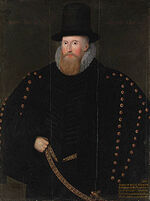-
Today in Tudor History...
05 August 1100 – Henry I is crowned King of England in Westminster Abbey.

1278 – The Siege of Algeciras ends in the context of the Spanish Reconquista pitting the forces of the Kingdom of Castile against the Emirate of Granada. The battle resulted in a Granadan victory.
1305 – William Wallace, who led the Scottish resistance against England, is captured by the English near Glasgow and transported to London where he is put on trial and executed.

1388 – The Battle of Otterburn took place on 5 August 1388,or 19 August according to English sources,as part of the continuing border skirmishes between the Scottish and English.
The best remaining record of the battle is from Jean Froissart's Chronicles in which he claims to have interviewed veterans from both sides of the battle. His account is still regarded with some concern as details, such as the distance between Newcastle upon Tyne and Otterburn, are incorrect.
The Scottish noble James, 2nd Earl of Douglas decided to lead a raid—one of a continuing series on both sides of the border—into English territory. It was timed to take advantage of divisions on the English side between Lord Neville and Henry Percy, 1st Earl of Northumberland who had just taken over defence of the border.

1461 – Birth of Alexander Jagiellon, Polish king
1534-Reformation of the Church.
“How the false heresies which the bishop of Rome hath taught the people should be brought out of their conscience and hearts.”
1. The archbishop of Canterbury should summon a council of bishops and doctors, and have them sign their decision on each of the articles contained in the “book of the charge.” Which done, copies should be sent to each county with command to every sheriff, custos rotulorum and justice of the peace, to have them read at every sessions and great leet. All parish churches should be visited, and the curates examined how they instruct the people. Let six or seven masters of the Chancery “of the right sort, nothing favoring the Pope's laws, nor having living thereby,” be appointed to judge questions of heresy. And let sermons in English be drawn up and appointed to be preached by the curates every Sunday.
Pamphlets against the doctrines of celibacy of the clergy, honoring of images and prayers for the dead to be printed before Parliament begins.
“Bills to be drawn against the next Parliament:”
1. Allowing priests to marry and to work for their living. 2. Prohibiting, on a penalty of 10l., all offerings to images. 3. For the reformation of the pleading in the common law. 4. For reformation of the Court of Chancery “as well for injunctions procedendo and examiners of witness.” 5. For the excessive fees taken by clerks for writing in every court in England.

1540 – Birth of Joseph Justus Scaliger, French philologist and historian
1549-Clyst St Mary was the site of one of the decisive battles in the 1549 Prayer Book Rebellion, when West Country resistance to the Protestant Reformation was quashed. After the Battle of Woodbury Common on 4 August 1549, the rebels under the control of Humphrey Arundell had re-grouped with the main contingent of 6,000 at Clyst St Mary, but on 5 August were attacked by a central force led by Sir William Francis, under the control of John Russell, 1st Earl of Bedford. After a ferocious battle Russell's troops gained the advantage leaving a thousand Cornish and Devonians dead and many more taken prisoner, 900 of whom were massacred later that day at Clyst Heath. The village was burned and many of the combatants and villagers drowned in the river
1583 – Sir Humphrey Gilbert establishes the first English colony in North America, at what is now St. John's, Newfoundland and Labrador.
1600 – The Gowrie Conspiracy against King James VI of Scotland (later to become King James I of England) takes place.
1601 - Burial of Henry Norris, 1st Baron Norris of Rycote, courtier, diplomat and son of Sir Henry Norris, one of the men executed for alleged adultery with Queen Anne Boleyn.
Henry died on 27 June 1601, having outlived his wife and five of his children, and was temporarily buried, on 21 May, in the church at Englefield, where his son Edward was living.Finally, on 5 August, he was re-interred at Rycote, in a vault beneath the chapel of St Michael and All Angels, in the grounds of Rycote House. His will was dated 24 September 1589.

source:wikipedia,http://www.british-history.ac.uk/
